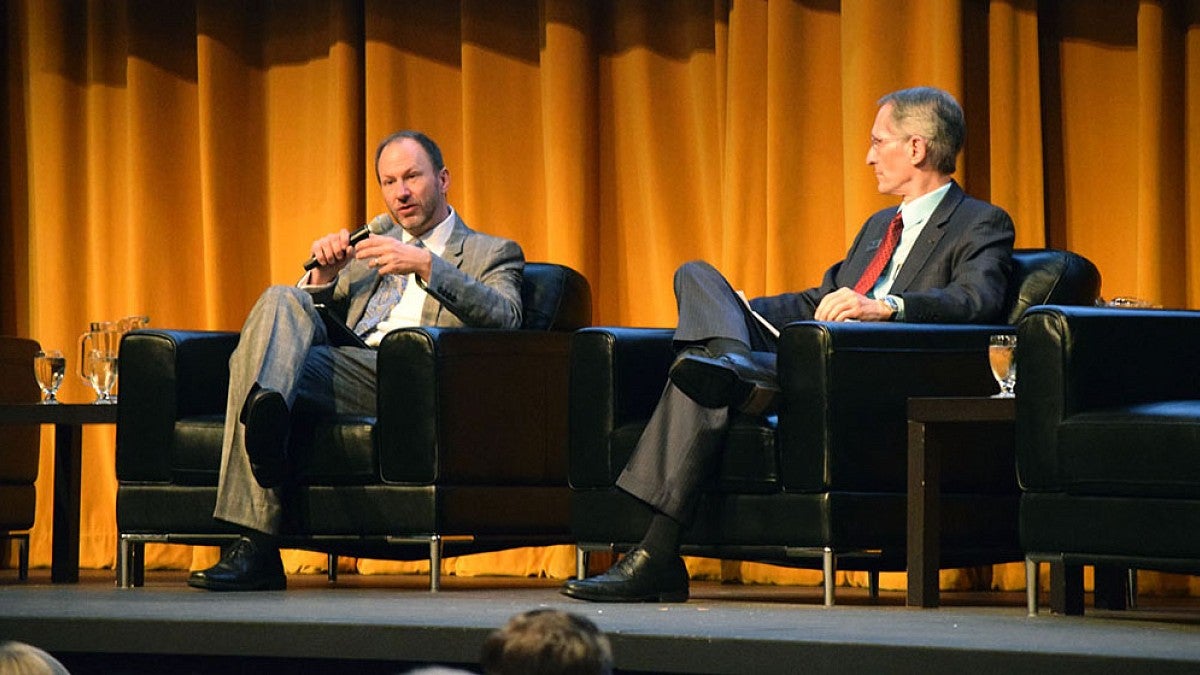The economy is heading into a record-breaking expansion with no strong indicators of a recession, yet investors are worried, according to University of Oregon economist Tim Duy.
Duy made the comment at the 15th annual Oregon Economic Forum in Portland on Oct. 17. The theme was “Reaching for Economic Equity and Inclusion in the Second Gilded Age.”
“This last year exceeded what we expected and some unexpected things gave pretty strong tailwinds, such as strong tax policies and spending that we thought would have been more difficult,” said Bruce McCain, chief investment strategist for Key Private Bank.
Duy and McCain, who provided the economic review and preview, discussed the nervousness of investors of a pending recession. The panel was moderated by Janet LaBar, president and CEO of Greater Portland Inc.
“There has been turbulence on Wall Street recently, but I don’t think that’s any more than noise in a bull market,” Duy said. “We’re in the mature stage of a business cycle. I hate to say that because that’s when we start to see the end of it, but I don’t think that’s the case. We’re in a place where we will see a slowing, but there’s nothing to indicate a major change in this cycle.”
By looking at reliable indicators, a recession shouldn’t be a complete surprise. Yet, both McCain and Duy see nervousness in the economy.
“This hasn’t been a normal cycle. The chance for extra innings this cycle is really high,” McCain said. “Strong economic cycles don’t die of old age.”
Coming out of the last recessions, companies and investors were less likely to overextend themselves and turned to buying back stock. There are not the “bubble” sectors like the housing and mortgage crisis of a decade ago.
“This is a fantastic economic environment to address equity and inclusion,” Duy said. “Firms got used finding the perfect ‘unicorn employees’ at the start of the expansion. They don’t exist anymore. Firms have to work hard to maintain their workforce. The more we can lift people into the labor force and give them skills to stay in the labor force, that’s really important to start addressing equity and inclusion.”
Keynote Heather Boushey, executive director and chief economist of the Washington Center for Equitable Growth, talked about the growing divide between the top income earners and everyone else and how that inequality shackles the growth of the economy.
“During the 1960s and 70s, when the economy grew at 1.7 percent, the vast majority of families saw a growth of 1.7 percent,” she said. “Now the vast majority don’t even see average growth. Only the top 10 percent of earners are seeing growth at or above average. As inequality and income rise, we see this calcify as wealth at the top. This has a detrimental effect on the vitality of the economy.”
One way this affects the economy is through the innovation and consumption of goods towards high-end earners, rather than the middle class. Another is limiting the opportunity for those not already at the top, which slows productivity growth over time.
“We are living through an era of increased concentration of capital and creation of monopolies not seen in over a century,” Boushsey said. “My main concern is about improving the living standard of most working-class families.”
Gregory Acs, vice president of the Income and Benefits Policy Center at the Urban Center, said part of the problem is that those in poverty have less income mobility.
“The fundamental tenet of the American Dream is your kids will do better than you,” he said. “But starting in the 1980s, there’s only a 50-50 chance of this. Economic mobility is sticky in the U.S. Mobility varies significantly by race, geography and even neighborhood. Poverty is not just about lack of money. It’s also about a lack of power and autonomy, and being valued in the community.”
Micro Enterprise Services of Portland is helping make a difference to low-income entrepreneurs through small capital loans and business support. Nita Shah, the executive director, talked about the way microfinancing can lift up underserved communities.
Their borrowers often couldn’t get financing and would turn to predatory lenders. The default rate at the nonprofit is 1 percent, and the borrowers often receive the support to grow their business and gain the tools to use traditional banks.
The Oregon Economic Forum is supported by the UO and the College of Arts and Sciences. KeyBank is the presenting partner. Other sponsors are NW Natural, OregonLive, Portland Business Alliance, Port of Portland and Greater Portland.
—By Heidi Hiaasen, University Communications


